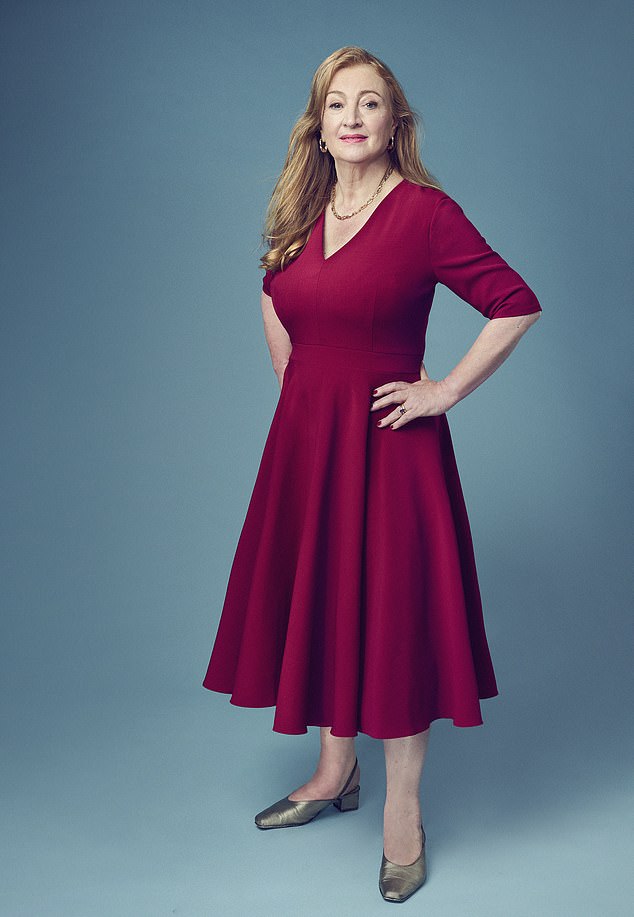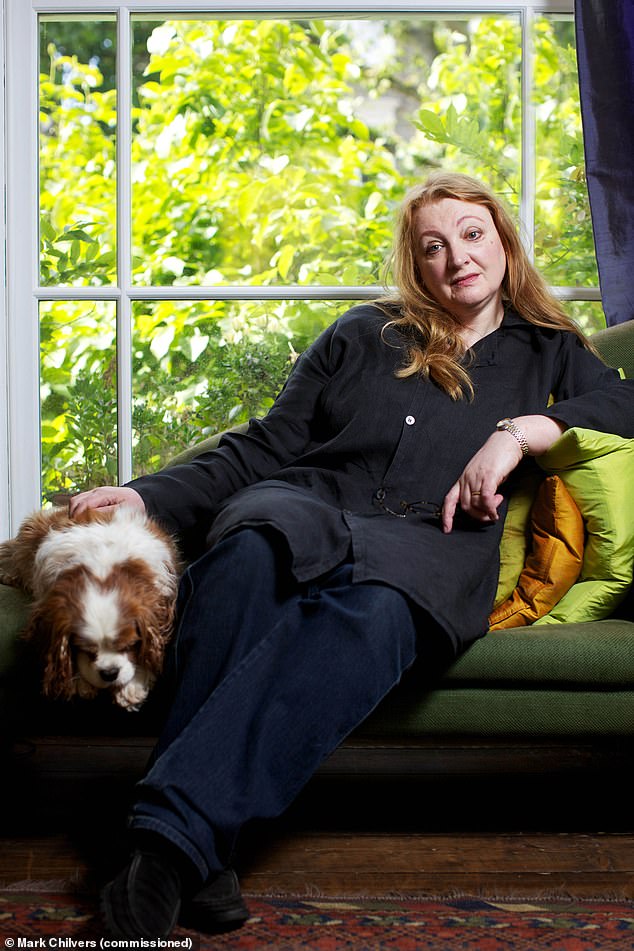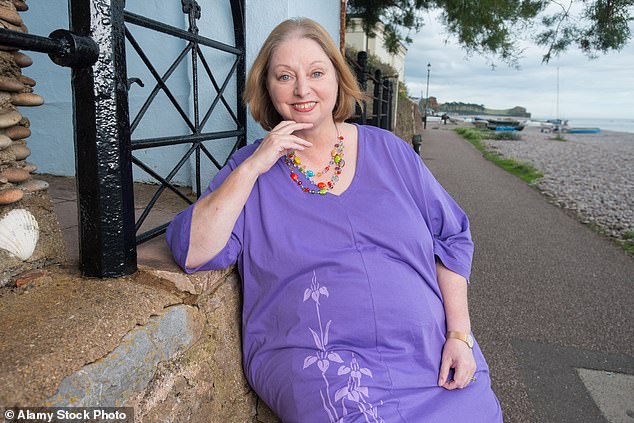I was at a book launch in aid of the Woodland Trust a few years ago when a famous TV presenter said to me, out of the blue, ‘Oh yes, you’re one of those fat literary women, aren’t you?’
I’d never met her before and was astonished by her gratuitous sneer – but it also stung.
As a novelist, I’d assumed my world was not like that of other parts of some media. Talent and intelligence are supposed to be what matters to writers, rather than how we look.
And as Hilary Mantel, the late, great, double Booker Prize winner well knew, being overweight is almost a professional disease, especially for women writers. Around half of us are overweight, if not bordering on obesity.
We struggle with this in common with millions of other women, but in our case the feeling of being the odd ones out starts early.
We are the quiet ones, who read in the corner of the playground instead of running around like normal children. In order to write we must ‘sit, sit, sit, sit’, as Dr Seuss puts it in The Cat In The Hat, even if we don’t like it, ‘not one little bit’.
I was actually mistaken for Mantel at a Faber summer party – especially weird because, though almost a decade younger and taller, I suffered from the same excruciating disease, endometriosis, that, as she describes in her memoir Giving Up The Ghost, made her have a hysterectomy in her 20s.
I was lucky enough to have two children before my disease had me writhing on the floor in agony and sitting on a plastic bag when driving because my bleeding was so heavy that it overwhelmed all sanitary protection. Despite repeated visits to GPs (one of whom suggested I might be allergic to Floris bath oil), it took me more than seven years to be diagnosed.

Amanda Craig went on Mounjaro last December, which she bought online as she wasn’t eligible for the jab on the NHS
Flogging my body in a bid to convince it to let me work was what caused my weight to balloon. If you are exhausted every day, chocolate is the only thing that gives you an energy boost.
I had keyhole surgery for the endometriosis and was given more modern drugs to combat it, but over three decades and nine novels, I went from being a size 12 to a size 20 – just like Mantel.
I tried everything, from diets to gyms to hypnotherapy. My repeated failures to lose weight were not due to being lazy or weak-willed – believe me, if you are what’s known as a ‘lifetime novelist’, you have formidable willpower. But until the miracle of Mounjaro came along, I was almost resigned to being insulted by the Mean Girls of the world. It had to be my own fault – didn’t it?
What really tipped the balance wasn’t just the other women writers whom I like and admire, such as Jenni Murray, Allison Pearson and Daisy Goodwin, extolling what the drug was doing for them. It was more the excruciating pain – this time in my knees.
Again, I went to the doctors.
‘It would help if you lost some weight,’ they would say, in the kindest medical manner. Their suggestions – keeping a food diary, using diet sheets, joining WeightWatchers – were useless, as I already knew.
I was sent to an acupuncturist for the pain and found a little relief – albeit only temporarily. ‘It could be arthritis,’ he said. However, a bone scan showed it was not. The pain, which felt like red-hot needles jabbing savagely under my kneecap, was so acute that it was keeping me awake at night. It afflicted even my one daily form of exercise – an hour of dog walking on London’s Hampstead Heath. Every 100 paces, I had to sit down to massage my knees and thighs, trying not to cry.
My beloved husband, who never once complained about my bloated figure, was now really worried about my health. So was I – I could feel the strain on my heart as well as my knees.

Over three decades and nine novels, Amanda went from a size 12 to a size 20. Pictured in 2011
‘I’d like to see your face back,’ he said, gently.
‘I’m sorry, I’m sorry,’ I replied, even as my hand crept towards the bread basket – as if, by eating surreptitiously, my addiction wouldn’t have an effect.
I am part of the luckiest generation in history, but my craving felt like a curse. I would eat a sandwich before going off for the occasional lunch with girlfriends, because otherwise I could eat not just one but two main courses, and see their expressions of shock.
I was appalled, too, and although I have never been particularly interested in what I look like, now I avoided mirrors like a vampire. Except the person I was draining of life was myself. I was digging my grave with my teeth.
I hobbled off to a top-notch physiotherapist who treats the cast of Strictly. She prodded and pushed and said she thought I had tendonitis, or an inflammation of the tendons in the upper thigh that go down to the kneecap.
However, apart from some stretches and ibruprofen, there seemed no solution unless I underwent bariatric surgery to make my stomach smaller like my spirited Cambridge contemporary Vanessa Feltz. I was chary of this.
I knew that if I didn’t make losing weight a project as central to my existence as writing a new book, I might end up like another friend, in a wheelchair. What we experienced wasn’t ‘food noise’, but food addiction.
It’s my belief that all writers are addicted to something – traditionally cigarettes, alcohol, sex or drugs. The reason for this is that we need a displacement activity. There are plenty of worse jobs, and we’re lucky to still be published, but writing is nothing like it is made to seem in films. It is gruelling and dominates your life in a way that a sane, sensible profession such as accountancy does not.

Author Hilary Mantel, who Amanda was mistaken for, by the sea near her home in the coastal town Budleigh Salterton, Devon in 2012
But when, last year, I read about the experiences of various writer friends – men as well as women – who had used the new drugs, I felt a flicker of hope.
Some (those on Ozempic) described side-effects of nausea and stomach upsets, but surely it would be worth it to not become a wheezing, wobbling wreck?
I asked my GP whether, at 15st and a size 20, I could be prescribed Mounjaro, but apparently a BMI of 30 wasn’t obese enough. (You have to have a BMI of at least 35 to get it for free, by which time you are going to be much sicker.)
So, in December last year, like thousands of others, I went online and paid for it.
You must check your online pharmacist’s credentials carefully (I use a site called MedExpress), but it’s about £50 cheaper than getting it from a private GP. Voucher schemes, including online firm Coupert, offer discounts, too.
The cost of mine has gone up with the strength of the dose from £160 to £180 per month – a price set to double on September 1, thanks to Trump’s tariffs.
Writers tend not to earn even a living wage, but I had a stroke of luck as my most recent novel, The Three Graces, was optioned for a TV series and I’d rather have this drug than buy new clothes – especially now I can fit into so many old ones again.
I was terrified of injecting myself but, to my amazement, I didn’t feel a thing. It was all quick and easy and, contrary to expectations, I experienced no nausea or digestive problems after the first dose. I didn’t stop enjoying food, I just didn’t crave it any more.
But the truly miraculous thing was that, within six hours, my knee pain had gone. Suddenly the jabbing agony vanished. Like the heroine of an Edwardian children’s novel, I could walk again! Each week, as my dose starts to wear off, the aches return, but they are swiftly stopped by the next dose.
I can find no medical explanation for this but Mounjaro is also an anti-inflammatory, which I suspect is why it had such a speedy effect on my knee pain.
It means I can exercise more, so I’m trying to build up more muscle support, which I was unable to do before. I walk, swim and work out.
Being returned to life at 65 has not just meant being able to go to the book launches I love. It has also meant a subtle change in how people behave towards me.
Being overweight is a professional handicap – it’s no coincidence that the waif-like authors Sally Rooney and Rachel Cusk are both pin-ups.
After ten months on Mounjaro, I’ve lost 20kg (more than 3st) and plan on losing another 10kg.
My friends have, at my request, promised to tell me if I get the dreaded ‘Mounjaro face’, where you look haggard and your skin becomes deeply furrowed.
I’m not aiming to be as slim as I was in my 20s, when I was a size 12 and weighed 60kg (9st 4lbs), either. That time has gone, and I am not chasing after my youth – just my health.
At the most recent party for the wonderful Women’s Prize, which promotes female writers around the world, I was surprised to be told how good I was looking. (Not, note, how ‘well’, which is code for ‘fat’.)
I saw several famous authors there who have mysteriously shed several stone, though they won’t say how.
The tent-like tunics we tend towards (women writers usually love the loose garb worn by famous names from E. Nesbit to A. S. Byatt) are being replaced by neat little jackets and trousers.
Everything about my Mounjaro life is better.
Before, I never drank more than seven glasses of wine a week, but now I hardly drink three and still feel merry. I eat a lot more protein and even more fruit. I have one square of dark chocolate in the evening and, though it tastes delicious, I just don’t ‘want’ any more than that.
The terrible craving that was ruining, and shortening, my life has gone.
I swear that I am thinking more clearly, and last month I finished writing a new novel, High And Low, in a record 15 months – though it, too, is slimmer than my usual 300 pages. I hope I won’t remain on the drug for life, but
if I do, I consider it a ‘luxury’ worth having.
What makes me angry is that weight-loss drugs will soon become one more thing that poorer people can’t afford.
It is my view that obesity and food addiction are a national disease, and that these drugs should be as cheap as the statins that save the lives of millions in this country.
I’ve become evangelical about what the jabs do, and not just because I feel so much happier. I want everyone to be healthy and out of pain, too. I want everyone to get ‘their’ face back.
In fact, if I meet that bitchy TV presenter again, I wonder whether she’ll recognise me.
- Amanda Craig’s novels include A Vicious Circle, Hearts And Minds and The Three Graces. Her new one, High And Low, will be published next May by Abacus












